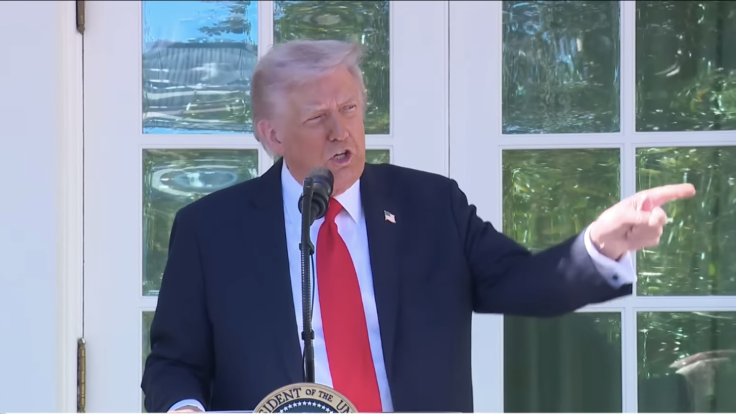Trump Pulls US Officials From G20 Summit in Protest of Alleged Bias Against White South Africans

KEY POINTS
- Trump announced a full U.S. boycott of the G20 summit in South Africa due to alleged discrimination of white citizens.
- The move marks the first total G20 withdrawal by a major nation.
- South Africa's President Cyril Ramaphosa denied Trump's claims as false.
The United States will not send any government officials to this year's G20 summit in Johannesburg, President Donald Trump announced on Friday, escalating his criticism of South Africa over what he called 'widespread discrimination and violence' against white citizens.
The announcement marks the first full boycott of a G20 meeting by a major member since the forum's creation in 1999.
Trump said his administration would not participate in the annual gathering of the world's largest economies until what he described as 'human rights abuses' against Afrikaners, or white South Africans of European descent, are addressed.
'Afrikaners, people descended from Dutch settlers and also French and German immigrants, are being killed and slaughtered, and their land and farms are being illegally confiscated,' Trump wrote on Truth Social. 'No US government official will attend as long as these human rights abuses continue.'
From Absence to Boycott
Trump had earlier said he would personally skip the Johannesburg summit, leaving Vice President JD Vance to represent the United States. Friday's announcement extends that decision to the entire administration, effectively withdrawing US participation. The move comes as Trump intensifies his criticism of South Africa's ruling African National Congress (ANC) and President Cyril Ramaphosa, accusing them of enabling racial violence.
'The situation in South Africa is tragic and unacceptable,' Trump told reporters at Mar-a-Lago. 'We cannot, in good conscience, sit at a table with leaders who turn a blind eye to persecution and murder. America stands with victims of racial violence everywhere, no matter their colour.'
South Africa Pushes Back
South African officials have dismissed Trump's claims as baseless. Ramaphosa directly rebuked the US president's narrative earlier this year, calling it a 'dangerous distortion' of reality.
'Have they told you where that is, Mr President?' Ramaphosa said in March when asked about Trump's 'white genocide' claim. 'I'd like to know where that is, because this I've never seen.'
South Africa's government has long maintained that violent crime in the country affects all racial groups and that there is no evidence of a systematic campaign against white farmers. Officials warned that Trump's comments risk inflaming racial tensions and undermining diplomatic ties between Pretoria and Washington.
Trump's Broader Policy Shift
The decision to boycott the summit underscores how Trump's second-term foreign policy increasingly prioritises ideological and cultural conflicts over traditional diplomacy.
Earlier this year, his administration quietly revised refugee admissions criteria to fast-track applications for Afrikaners claiming persecution, a move critics said amounts to a 'racialised refugee policy'.
Secretary of State Marco Rubio echoed the president's stance, saying he too would skip the Johannesburg meeting. 'Bad things are happening in South Africa,' Rubio wrote on X. 'This summit is focused on "solidarity, equality, and sustainability" — in other words, disaster for America's interests.'
Economic and Diplomatic Ripples
The boycott will leave the US chair at the Johannesburg summit empty, a rare absence that could strain relations with other G20 members.
The meeting, which will focus on sustainable growth, climate finance and global trade, is regarded as a key opportunity for developing nations to push for fairer treatment within international financial systems.
Trump's withdrawal may also signal a broader retreat from multilateral engagement, reinforcing the 'America First' doctrine that defined his first term. Analysts say it could embolden China and Russia to expand their influence among African and emerging economies.
'The absence of the United States at such a critical forum sends a message of disengagement at a time when global cooperation is desperately needed,' said Daniel Rosen, a senior analyst at the Centre for Strategic Studies. 'It hands other powers an opening to shape global economic rules without American input.'
Looking Ahead to Miami 2026
The 2025 boycott will also cast a shadow over next year's summit, which the US is scheduled to host at Trump's own property in Miami. The decision to hold the global event there has already drawn criticism from ethics groups, who argue it blurs the line between public office and private gain.
Still, Trump remains defiant. 'Next year, world leaders will meet in a place that respects freedom, fairness and safety,' he said. 'We will host the greatest G20 ever, and we'll do it right here in the United States.'
As the Johannesburg summit convenes without an American delegation, US allies are expected to navigate discussions without Washington's input — a striking symbol of how Trump's second term has reshaped America's role in the world.
© Copyright IBTimes 2025. All rights reserved.




















